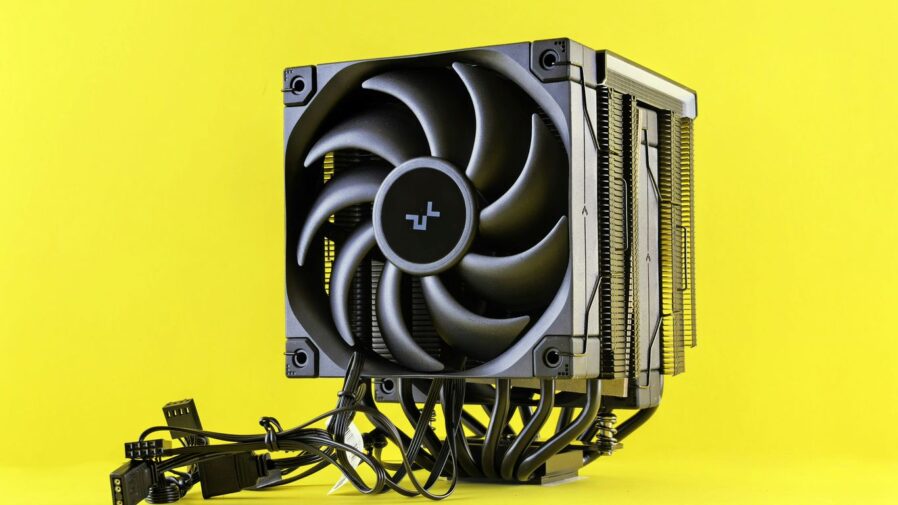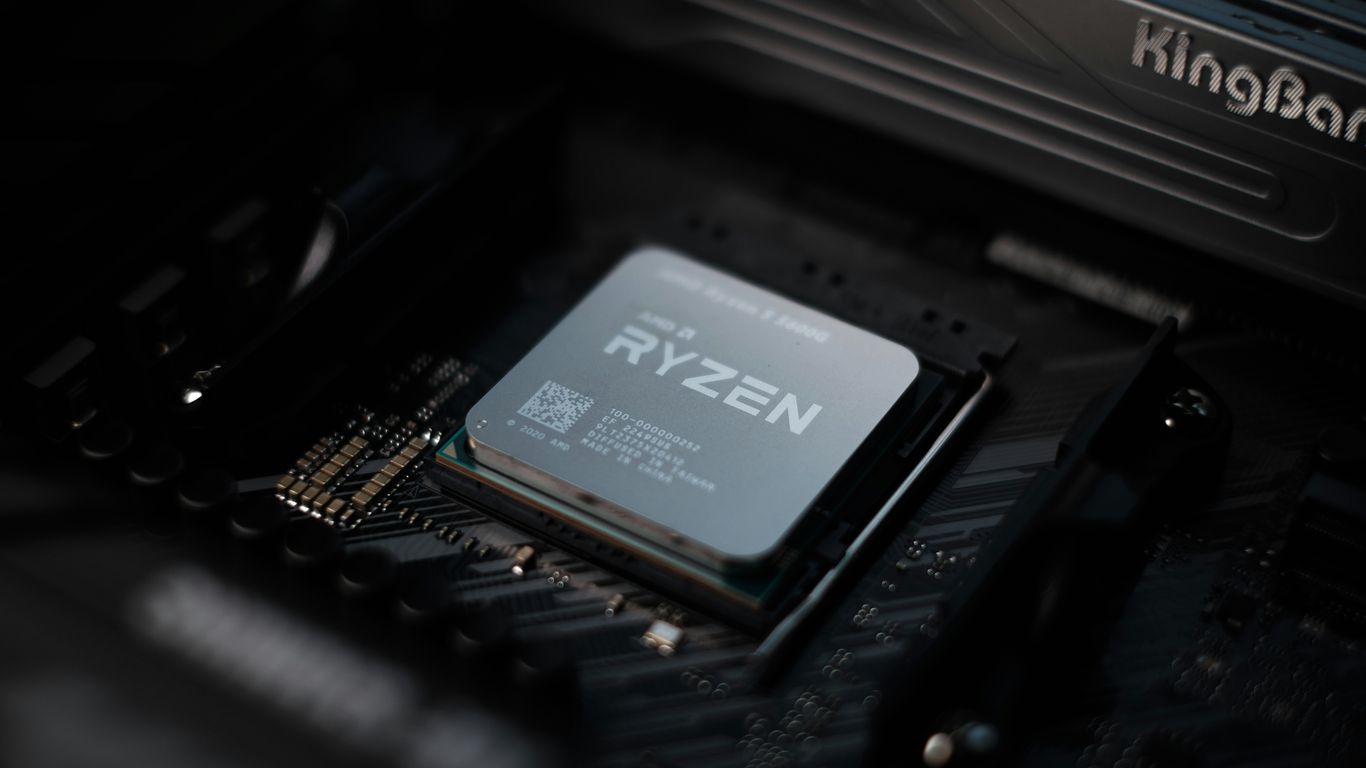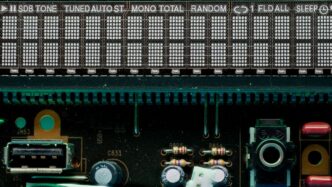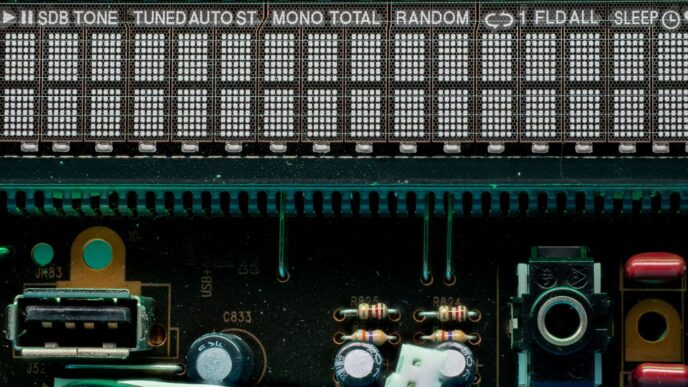Finding the best CPU for gaming 2025 can feel like a puzzle. You want something that makes your games run smooth without costing a fortune. We looked at a bunch of processors from AMD and Intel to see which ones really stand out for players. Whether you’re building a new PC or upgrading an old one, this list should help you figure out what’s best for your setup and your wallet. Let’s get into it.
Key Takeaways
- For the absolute best gaming performance, the AMD Ryzen 7 9800X3D is the top pick, offering excellent frame rates.
- If you need top-tier performance for both gaming and demanding work, the AMD Ryzen 9 9950X3D is a powerful, albeit pricier, option.
- The Intel Core i9-14900K provides strong gaming performance and good multi-tasking abilities, especially at its current price point.
- For a great balance of gaming speed and cost, the AMD Ryzen 7 7800X3D remains a solid choice and a good value.
- When looking for good performance without breaking the bank, consider options like the AMD Ryzen 5 9600X or Intel Core i5-14600K.
AMD Ryzen 7 9800X3D
So, the AMD Ryzen 7 9800X3D. This one’s pretty much the king of the hill for gaming right now, and honestly, it’s not even close. AMD really nailed it with this chip. It’s built on their Zen 5 architecture, which is a step up, and they’ve refined the 3D V-Cache technology. What that means for us gamers is that it can run at higher speeds and, get this, it actually runs cooler than previous X3D chips. I saw temps staying below 70°C even when I was really pushing it, which is pretty wild.
When you look at the numbers, it’s impressive. In my tests at 1080p, I was hitting around 239 FPS, 176 FPS at 1440p, and even at 4K, it was a solid 110 FPS. That’s a big jump over a lot of other CPUs out there. Plus, the AM5 platform it uses is supposed to be supported by AMD until at least 2027, so you’re not going to be stuck with an outdated system anytime soon. It also means you get all the new stuff like PCIe 5.0, DDR5 memory, and even USB 4. It’s a really solid package if you’re serious about gaming.
Here’s a quick rundown of why it’s so good:
- Top-tier gaming performance: It consistently beats out other CPUs, even more expensive ones, in gaming benchmarks.
- Improved efficiency: Despite the performance, it doesn’t guzzle power and stays relatively cool, making it easier to manage thermals.
- Future-proof platform: The AM5 socket means you can upgrade down the line without needing a whole new motherboard.
- Overclocking support: Unlike some older X3D chips, this one lets you push it even further if you want more speed.
Honestly, if you’re building a new gaming rig or looking for the absolute best gaming experience, the Ryzen 7 9800X3D is the way to go. It’s a bit of an investment, sure, but for the performance you get, it’s totally worth it. It’s even powering some of the latest virtual reality setups, showing how capable it is. AMD’s VR tech is really something else, and this CPU fits right in.
AMD Ryzen 9 9950X3D
Alright, let’s talk about the big guns. The AMD Ryzen 9 9950X3D is kind of the "do-it-all" chip for people who want the absolute best, no compromises. It’s got 16 cores and 32 threads, which is a ton of power for pretty much anything you throw at it, not just games. What’s really cool is that AMD managed to slap their 3D V-Cache tech onto this beast without hurting its productivity performance. That means it can hang with the best in creative work and still absolutely crush it in gaming.
In benchmarks, this chip often ties with the Ryzen 7 9800X3D in gaming, which is pretty wild considering it has way more cores. For productivity tasks, it keeps pace with the regular Ryzen 9 9950X, which is a big deal. This chip uses the AM5 socket, so it’s ready for future upgrades too.
Here’s a quick look at some specs:
- Architecture: Zen 5
- Cores/Threads: 16/32
- Max Boost Clock: 5.7 GHz
- Total Cache: 144 MB
- TDP: 170W
It’s definitely on the pricier side, and it can run a bit warm, so make sure you’ve got a solid cooler ready. But if you’re building a top-tier rig and want top-tier performance in both gaming and work, the Ryzen 9 9950X3D is a serious contender.
Intel Core i9-14900K

Alright, let’s talk about the Intel Core i9-14900K. This chip is basically Intel’s previous generation’s top dog, the 13900K, but with a little extra clock speed. It’s got a hefty 24 cores and 32 threads, with those high-performance cores hitting a mind-boggling 6.0 GHz. That sounds impressive, and for pure gaming, it can definitely hold its own.
However, it’s not all sunshine and rainbows. This thing runs hot, and if you’re not careful with your cooling setup, you’ll see it throttle back, losing some of that promised performance. Honestly, if you can snag the 13900K for a better price, you’re probably getting a very similar experience in most games.
Here’s a quick look at what it brings to the table:
- Core Count: 24 (8 Performance-cores + 16 Efficient-cores)
- Thread Count: 32
- Max Boost Clock: Up to 6.0 GHz
- Socket: LGA 1700
- Memory Support: DDR4 and DDR5
- PCIe Support: PCIe 5.0
While it offers great gaming performance and a solid punch for productivity tasks, it’s also quite power-hungry. You’ll absolutely need a robust cooling solution and a good motherboard to keep it happy. For many, the slightly less powerful but more efficient Core i7-14700K might be a smarter buy, offering nearly the same gaming chops for less cash.
AMD Ryzen 7 7800X3D
Okay, so the Ryzen 7 7800X3D. This chip was, for a good while, the absolute king of gaming CPUs. It really changed the game with its 3D V-Cache technology, stacking extra cache right on top of the processor. This made a huge difference in games, especially ones that really need fast access to data. It’s built on the AM5 platform, which is pretty solid and AMD has said they’ll keep supporting it for a while, which is nice for future upgrades.
When it came out, it was a bit of a no-brainer for anyone serious about gaming. It offered performance that often beat even more expensive CPUs, and it did it without needing a super beefy cooler or a massive power supply. That was a big deal. It’s still a fantastic chip, don’t get me wrong. If you’re building a new PC right now and want great gaming performance without breaking the bank on the absolute bleeding edge, this is still a really strong contender.
Here’s a quick look at what it offers:
- 8 Cores / 16 Threads: Plenty for most games and even some multitasking.
- Zen 4 Architecture: Still very capable and efficient.
- 96MB L3 Cache: This is the magic sauce for gaming.
- 120W TDP: Makes it relatively easy to cool.
While newer chips have come out and taken the top spot, the 7800X3D remains a benchmark for what a dedicated gaming CPU can do. It’s a great balance of price and performance, and it’s still a CPU that many people will be perfectly happy with for years to come.
Intel Core i7-14700K
Alright, let’s talk about the Intel Core i7-14700K. This chip is a pretty solid contender if you’re looking for a good balance of gaming power and productivity without completely emptying your wallet. Intel really bumped up the core count on this one compared to the previous generation, adding four more of those efficient ‘E’ cores. So, you’re getting a total of 20 cores (8 performance, 12 efficiency) and 28 threads.
For gaming, it performs really close to Intel’s top-tier i9-14900K, often hitting about 97% of its performance, but for a noticeably lower price. That’s a pretty sweet deal, honestly. Plus, if you like to tinker, it’s unlocked, so you can push it even further with overclocking to match that flagship performance. It supports the latest tech too, like DDR5 memory and PCIe 5.0, which is great for future-proofing your build.
Here’s a quick look at its specs:
- Architecture: Raptor Lake Refresh
- Cores/Threads: 20 (8P + 12E) / 28
- Max Boost Frequency: 5.6 GHz
- Socket: LGA 1700
- Processor Base Power: 125W
It’s a strong all-around performer, especially if you do more than just game. Tasks like streaming or heavy multitasking while gaming will feel smoother. Just be aware that it does draw a fair bit of power, so you’ll need a good cooler to keep it happy – don’t expect it to come with one in the box. If you’re upgrading an older LGA 1700 system, this is definitely worth considering. It’s a nice step up from older chips, offering more cores and better overall performance for the money. You can find some great deals on components for building a new PC, like checking out Newegg deals for various parts.
AMD Ryzen 5 9600X
Alright, let’s talk about the AMD Ryzen 5 9600X. This chip is kind of the entry point into AMD’s newer Zen 5 lineup, and honestly, it’s a pretty solid choice if you’re trying to build a good gaming PC without spending a fortune. It’s got six cores and twelve threads, which is usually enough for most games out there right now. Plus, it runs pretty efficiently, with a 65W TDP, meaning it doesn’t guzzle power and shouldn’t make your PC run super hot, which is always a plus.
For the price, the gaming performance you get from the 9600X is really quite good. It’s not going to beat the super high-end CPUs, obviously, but it holds its own, especially at 1080p. We saw it hitting around 197 FPS in some tests, and the temps stayed pretty low, like 57°C, which is great. That means you can probably get away with a less beefy cooler than you might need for some other chips.
One of the big selling points here is the AM5 platform. If you buy this CPU, you’re getting access to the latest tech like DDR5 memory and PCIe 5.0. AMD has also said they’ll support the AM5 socket for a while, so you have a path to upgrade to a faster CPU down the line without needing a whole new motherboard. That’s some decent future-proofing.
Here’s a quick rundown of what makes it a good pick:
- Good Gaming Value: It offers strong performance for its price point, making it a smart choice for budget-conscious gamers.
- Efficient Operation: With its low TDP, it runs cooler and uses less power, which is always a win.
- Modern Platform: Access to the latest I/O like PCIe 5.0 and DDR5 means your system will be up-to-date.
- Upgrade Path: The AM5 socket offers flexibility for future CPU upgrades.
Now, it’s not perfect. You do have to buy your own cooler, which adds a bit to the cost. And if you’re doing a lot of heavy work like video editing or complex simulations, there are definitely more powerful options out there. But for pure gaming on a budget, the Ryzen 5 9600X is a really sensible option.
Intel Core i5-14600K
Alright, let’s talk about the Intel Core i5-14600K. This chip is a pretty solid contender if you’re building a new gaming PC and don’t want to break the bank, but still want good performance. It’s got a mix of performance cores and efficiency cores, which is Intel’s way of handling different tasks. For gaming, those performance cores really do the heavy lifting.
When it comes to specs, you’re looking at 14 cores total, with 6 of them being the high-performance kind and 8 being the efficiency ones, giving you 20 threads to work with. The boost clock can hit up to 5.3 GHz, which is plenty fast for most games out there. It also supports the newer DDR5 memory and PCIe 5.0, so your system will be ready for future upgrades.
Here’s a quick look at how it stacks up:
| Feature | Intel Core i5-14600K |
|---|---|
| Architecture | Raptor Lake Refresh |
| Cores/Threads | 14 (6P + 8E) / 20 |
| Max Boost | 5.3 GHz |
| Socket | LGA 1700 |
| PCIe Support | 5.0 |
| Memory Support | DDR4 / DDR5 |
One thing to keep in mind is that Intel doesn’t include a cooler with this CPU, so you’ll need to factor that into your budget. You’ll also need a compatible motherboard, usually a 600 or 700 series, and make sure the BIOS is up to date. Overall, it’s a really good mid-range option that offers a lot of bang for your buck, especially if you’re focused on gaming. It’s a step up from older generations and provides a good foundation for a modern gaming rig, ready for things like lag-free wireless display streaming.
AMD Ryzen 7 5700X3D
Alright, let’s talk about the AMD Ryzen 7 5700X3D. If you’re still rocking an AM4 motherboard and looking for a solid gaming upgrade without breaking the bank, this chip is definitely worth a look. It’s basically a slightly toned-down version of the popular 5800X3D, but that comes with a much friendlier price tag. You still get that sweet, sweet 3D V-Cache technology, which is a big deal for gaming performance, especially in titles that really benefit from extra cache.
Think of it as getting about 91% of the gaming performance of its pricier sibling for a good chunk less cash. That’s a pretty sweet deal, right? It means you can save some money that can then be put towards a better graphics card or more RAM, which often makes a bigger difference in your overall gaming experience.
Here’s a quick rundown of what you’re getting:
- Architecture: Zen 3
- Cores/Threads: 8/16
- Base Clock: 3.0 GHz
- Boost Clock: 4.1 GHz
- L3 Cache: 96 MB (with 3D V-Cache)
- TDP: 105W
Now, it’s not all sunshine and rainbows. This CPU is really built for gaming, so don’t expect it to blow you away in productivity tasks like video editing or heavy multitasking compared to some other chips in its price range. Also, it does tend to run a bit warm, so having a decent cooler is a good idea to keep things running smoothly. It also doesn’t support the latest bells and whistles like DDR5 or PCIe 5.0, but that’s to be expected given it’s on the older AM4 platform. Still, for pure gaming on a budget, the AMD Ryzen 7 5700X3D is a really compelling option.
Intel Core i5-12400

Alright, let’s talk about the Intel Core i5-12400. This chip was a real solid choice for budget builds back when it came out, and honestly, it still holds its own if you’re not trying to break the bank. It’s got six cores and twelve threads, which is plenty for most games you’ll be playing. It offers a good balance of gaming performance and price, making it a go-to for many.
When this CPU first hit the market, it was often recommended over AMD’s Ryzen 5 5600, especially if you needed support for newer tech like PCIe 5.0. While the 5600 is a capable chip, the 12400 brought a more modern platform to the table. It uses the LGA 1700 socket, so you’ve got a decent range of motherboards to choose from, including more affordable B-series options. You can pair it with either DDR4 or DDR5 RAM, depending on your budget and what you’re aiming for.
Here’s a quick look at some of its specs:
- Architecture: Alder Lake
- Cores/Threads: 6 / 12
- Max Boost Frequency: 4.4 GHz
- TDP: 65W
It’s not the flashiest CPU out there, and it doesn’t have integrated graphics (unless you get the non-F version), so you’ll definitely need a dedicated graphics card. Also, don’t expect to do any heavy CPU overclocking with this one. But for a straightforward gaming PC that plays games well without costing a fortune, the i5-12400 is still a sensible pick. It’s a good starting point if you’re building a system and want to save some cash for a better graphics card, which is usually the most important part for gaming anyway. You can find some great deals on games that run well on less powerful hardware, like Hearthstone.
AMD Ryzen 5 5600
Alright, let’s talk about the AMD Ryzen 5 5600. This chip has been around for a bit, but it still holds its own, especially if you’re trying to build a solid gaming PC without spending a fortune. It’s built on the Zen 3 architecture, which is pretty decent, and it packs six cores with twelve threads. That’s usually enough grunt for most games out there today, and it handles everyday tasks just fine too.
One of the big selling points for the 5600 is its price. You can often find it for a really attractive amount, making it a go-to for budget builds. It really punches above its weight class for the money. When I tested it, paired with something like a GTX 1660 Super, it managed to push out over 60 frames per second in a lot of games at 1080p, especially if you tweak the settings a bit or use upscaling tech like DLSS or FSR. It’s not going to break any performance records, but for the cost, it’s a great starting point.
Here’s a quick look at how it stacks up:
- Cores/Threads: 6 / 12
- Base Clock: 3.5 GHz
- Boost Clock: 4.4 GHz
- L3 Cache: 32MB
- TDP: 65W
Now, a couple of things to keep in mind. This CPU doesn’t have integrated graphics, so you absolutely need a separate graphics card to get anything done. Also, while it’s a great chip for its price, if you’re looking for the absolute latest features like DDR5 memory or PCIe 5.0 support, you’ll need to look at newer platforms, like the AM5 socket which supports processors like the AMD Ryzen 5 9600X. The 5600 uses the older AM4 socket, which is still widely supported and has plenty of affordable motherboard options, which is a plus for budget builders. Overall, the Ryzen 5 5600 is a sensible choice for gamers who want good performance without breaking the bank.
So, What’s the Verdict?
Alright, so we’ve looked at all the chips, done the tests, and it’s pretty clear. For the absolute best gaming experience you can get right now, the AMD Ryzen 7 9800X3D is really the one to beat. It just pulls ahead in most games, and it does it without guzzling power like some others. If you’ve got the cash and want top-tier frame rates, this is your guy. But hey, if you’re looking for something that still plays great but doesn’t break the bank quite as much, there are solid options from both AMD and Intel that will get the job done. Just remember to build a balanced system – a great CPU needs good supporting parts to really shine. Happy gaming!
Frequently Asked Questions
What’s the main difference between AMD and Intel CPUs for gaming?
Think of AMD and Intel like two different brands of game consoles. Lately, AMD has been really good at making CPUs that are awesome for playing games on regular computers. But both brands have chips that work great for gaming, and it really depends on what you want to spend and what games you play.
Does a faster clock speed mean better gaming?
For games, a faster clock speed usually makes things run smoother and quicker. It’s like having a car engine that revs up faster. More ‘cores’ (which are like little workers inside the CPU) are better for doing lots of things at once, like playing a game while also recording it, but for just playing games, speed often matters more.
Is it worth buying the most expensive CPU for gaming?
The most expensive CPUs, like the AMD Ryzen 9 9950X3D, are super powerful and can handle anything. But sometimes, a slightly less expensive option, like the AMD Ryzen 7 9800X3D, offers almost the same gaming speed for much less money. It’s like buying a sports car versus a slightly slower, but still very fast, sports car – you have to decide if the extra speed is worth the extra cost.
What is ‘3D V-Cache’ and why is it important for gaming?
3D V-Cache is a special technology AMD uses that puts extra memory right on the CPU. This extra memory helps the CPU access game data much faster, which can make your games run way smoother and give you more frames per second. It’s like having a super-fast lane for your game’s information.
Do I need to worry about my CPU overheating?
Yes, powerful CPUs can get hot, especially when you’re gaming hard. It’s important to have a good cooling system, like a strong fan or a liquid cooler, to keep your CPU running at its best and prevent it from getting damaged. Think of it like making sure your game console has good ventilation so it doesn’t overheat.
Are older CPUs still good for gaming in 2025?
Some older CPUs, like the AMD Ryzen 5 5600 or Intel Core i5-12400, can still be good choices if you’re on a tighter budget. They might not give you the absolute highest frame rates in the newest games, but they can still offer a really enjoyable gaming experience, especially if you pair them with a good graphics card.














